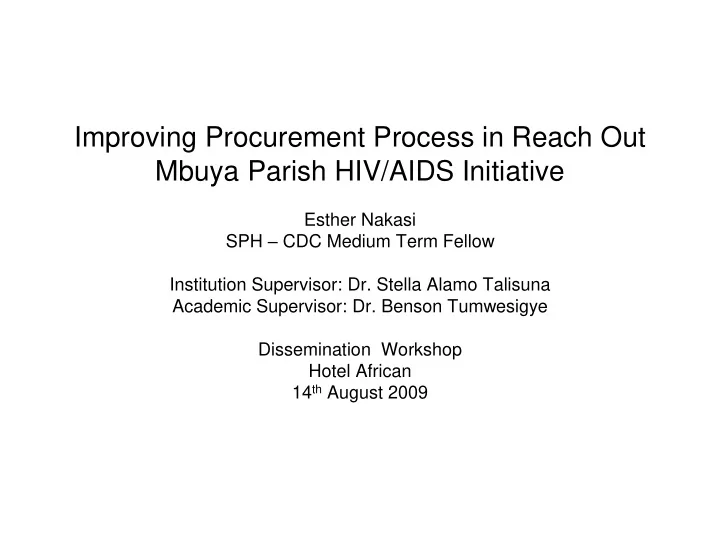

Improving Procurement Process in Reach Out Mbuya Parish HIV/AIDS Initiative Esther Nakasi SPH – CDC Medium Term Fellow Institution Supervisor: Dr. Stella Alamo Talisuna Academic Supervisor: Dr. Benson Tumwesigye Dissemination Workshop Hotel African 14 th August 2009
About Reach Out Mbuya • Community, faith-based NGO in Mbuya Parish • Founded in May 2001 • Provide Holistic care – body, mind, family and 1 community. • Serves 3093 clients in care, 1697 on ART • Has two directorates and 4 departments 2
Procurement Section • Procurement section was set up in 2007 • Headed by Procurement officer and supervised by the Executive Director • Handles all procurement issues Goods, services and works
Problem Identification 1. Long procurement 6. Lack of an process integrated 2. Long waiting time for information system clients 7. Poor communication 3. Poor adherence among adolescent 4. Declining adherence among children on ART 5. High population of sero-discordant couples
Problem Statement • Since July 07 till Dec.08, Reach Out Mbuya has had long procurement process: 4 to 8 weeks for major purchases, 2 to 4 weeks for minor purchases • Long procurement process leads to stock out of essential items e.g. drugs • Target for improvement: Reduce the procurement process by two weeks by: Formulating guidelines and procedures
Flow Chart Showing baseline Situation of the Procurement Process Budgetary checks Departmental Cross checking and Allocation meetings – Requisition Requisition Form (DFAM) Decisions on Generation – Proc. Officer what to procure N Approved Delay Yes/No Delay 5 days Receipt of 07 days Goods/ Y N Service Executive (Stores) Director’s Approval Writing Getting Local Procurement Pro- Receipt of Y Purchase committee forma LPO & N Approve Order Invoices Preparation d Yes/No for Delivery BOD Delay Approval 03 wks
Project objectives Objectives: • To improve the procurement process at Reach Out Mbuya so as to improve service delivery to clients • To develop procurement manual by June 2009 • To disseminate procurement procedures to management and staff
Project implementation • Discussion of need with management • Formation of CQI team • Problem identification • Review of the available information • Design of the project • Funding from SPH-CDC • Implementation of the project • Draft procurement manual • Dissemination of draft to staff members
Dissemination Session
Results / Project Outcome • Procurement manual in place • The procurement committee meets regularly to review procurement • Copy of the manual distributed to staff • Additional staff procurement: procurement assistant and volunteer
Flow Chart Showing change in the process after the intervention Budgetary checks Departmental Cross checking and Allocation meetings – Requisition Requisition Form (DFAM) Decisions on Generation – Proc. Officer what to procure Approved 07 days 5 days Yes/No to Receipt of to Goods/ 03 days 2 days - Service Executive (Stores) Director’s Approval Writing Getting Local Procurement Pro- Receipt of Purchase committee forma LPO & Approve Order Invoices Preparation d Yes/No for Delivery 03 wks BOD To Approval 01wk
Lessons Learnt • Brain storming is critical in identifying organisational challenges • Root cause analysis procedure is effective in problem identification • Team work is key in project implementation • Involvement of senior management in project implementation is key to success • Quality improvement is a continuous process.
Challenges • Turn over of resourceful personnel of the CQI team • Various commitments and assignments with in the organisation delayed the project • Time frame was too short to accomplish the project
Sustainability • Periodical review of the manual to adopt any new developments in the organisation. • Orientation of all new staff on the manual. • Continuous training of staff to give them updates in the procurement process. • All procurement activities must be carried out basing on the manual
Acknowledgements • SPH-CDC • Executive Director • Academic Supervisor • CQI Team members • Long term SPH-CDC fellow attached to ROM • Senior management of ROM • Staff of ROM • Clients of ROM.
Fellows having a discussion with the academic supervisor
THANK YOU
Recommend
More recommend